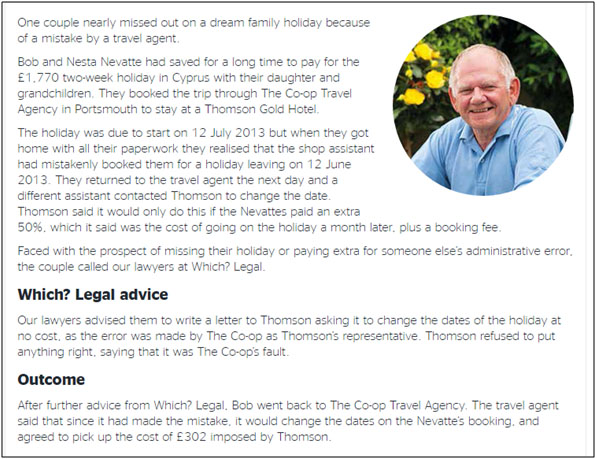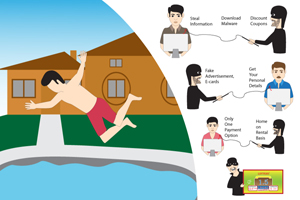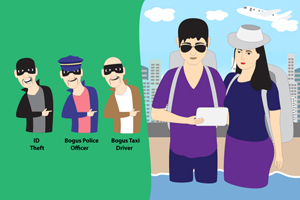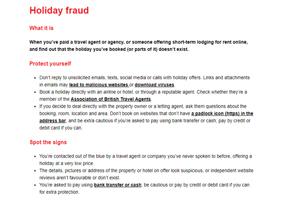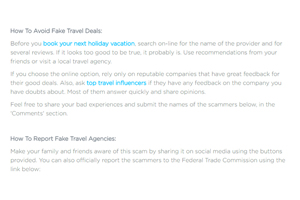Holiday and Travel Scams
Beware of holiday and travel scams
Travel scam- A big network
Scammers often approach you with claims that you have won travel vouchers, which include heavily discounted holiday accommodations and airfares to popular tourist destinations such as Indonesia, Thailand, Florida, and the Bahamas. If you decide to accept the offer, they will first request your credit card, bank, and personal details before sending the vouchers. Once you provide the information, they will quickly withdraw money from your account and disappear. In most cases, victims are given fake or duplicate vouchers to prevent suspicion until the scammers have moved to a safer place. The goal of this scam network is not only to steal your money but also to misuse your personal details and make you a victim of identity theft.
Ways to keep holiday and travel scams at bay :
Do research, before you choose
Never reveal your bank details
When it comes to holiday scams, the way you make your payment matters significantly. Whether you pay by cheque, wire transfer, or online transfer, never reveal your bank details. Always use a secure payment method such as a credit card, as it offers an added layer of protection—you may be able to request a chargeback if the deal turns out to be fraudulent or unsatisfactory. If you suspect you've been scammed after sharing your bank information, act quickly: contact your bank or financial institution immediately to prevent the scammers from misusing your account.
Read the terms and conditions of the travel promoters clearly
If you're planning to book a sports-related tour package, make sure it includes all essentials—hotel accommodations, meals, airfare, and game tickets. During the last Olympics, many travelers were scammed by illegitimate travel promoters who provided vouchers for travel and accommodation, but failed to deliver the actual event tickets. As a result, some were left watching the games from their hotel rooms instead of the stadium. To avoid such disappointments, always read the terms and conditions of any discounted travel package carefully—preferably more than once.
By following these precautions, you can protect yourself from holiday and travel scams that could otherwise leave you stranded abroad with empty pockets.
The holiday and travel sector is a prime target for scammers. With frequent and luxurious travel becoming a norm for many affluent individuals, scammers seize the opportunity to exploit unsuspecting travelers with deceptive tactics aimed at stealing money. The scam industry is vast and evolving rapidly—often faster than most people can imagine. While many methods remain unknown to the general public, there are several common and emerging types of holiday and travel scams that you should be aware of:
Common forms of holiday scams to watch out for:
1. Timeshares and Holiday Clubs
Scammers lure victims with promises of free vacations, luxury stays in 5-star or 7-star hotels, and adventure experiences at discounted rates. Targets are invited to seminars featuring high-pressure sales tactics and polished presentations. Many end up signing fraudulent timeshare contracts, often without realizing the long-term financial commitments involved.
2. Holiday Accommodation Scams
This is one of the most widespread travel scams. Fraudsters create fake websites, hijack legitimate booking accounts, and post deceptive ads on social media and travel portals. Victims are tricked into paying for accommodations that either don’t exist or are not actually available.
3. Airline Ticket Scams
Scammers offer heavily discounted airline tickets—especially for round-trip bookings—to entice travelers. Once the payment is made, the victim may receive fake tickets or find out later that the ticket was never issued.
Real-Life Example: In 2014, a newlywed couple from North Yorkshire was scammed out of £1,000 while booking a romantic Valentine's weekend getaway to Loch Ness. They discovered too late that the airline booking site they used was operated by fraudsters.
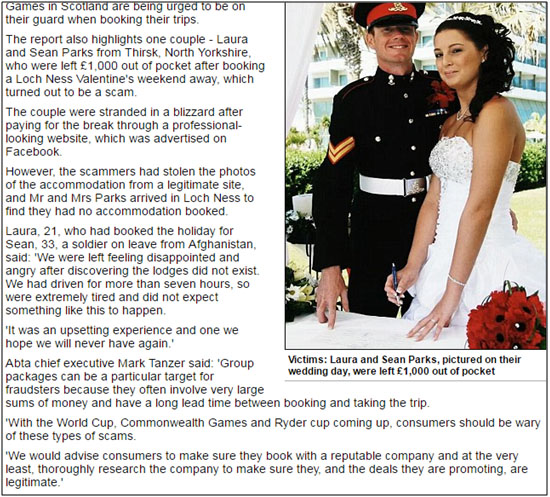
Warning signs to watch out for to avoid holiday and travel scams:
Be wary when you are offered unusually low rates compared to what other competitors are offering. Do an internet search—check their websites, visit travel and holiday forums, and most importantly, look into reviews and references.
In the case of legitimate holiday packages, only a small deposit is typically requested to confirm a booking, with the remaining balance due a few days before the trip. Therefore, if someone demands full payment upfront, consider it a strong indicator of a scam.
Warning Sign 2Websites with low-resolution images and fuzzy logos are often red flags. Take time to research thoroughly before making any payments. Scammers may hack into legitimate holiday accommodation sites or create fake websites that look authentic at first glance.
Warning Sign 3Be cautious when the only payment option offered is bank transfer. This method is risky because it is virtually impossible to recover your money if the scammer vanishes or the agency turns out to be fraudulent.
According to a 2014 report by the City of London Police National Fraud Intelligence Bureau, approximately £7 million was lost to holiday fraud, including £2.2 million from online scams. The average individual loss was reported to be £889, with one person losing as much as £62,000 in a timeshare-related scam.Types of travel scams:
Bogus Police Officers Travel Scam :
It is not uncommon for victims to encounter fake police officers who accuse travelers of crimes they haven’t committed or demand that they hand over their wallets and personal belongings for “verification purposes.” This tactic gives scammers access not only to your money but also to your ID, which can later be used for identity theft. Another common trick involves a bystander who asks a traveler to watch over their luggage while they step away. Soon after, fake police officers appear and insist on searching the bag, claiming to have received reports of illegal items. During the search, they "discover" contraband and then demand a large bribe to avoid arrest. In such situations, do not panic. Calmly ask to be taken to the nearest police station to resolve the matter through proper legal channels. This usually causes scammers to back off.
ID theft in Travel Scam :
This usually happens through various means, such as ATMs that steal credit card information, the use of free public Wi-Fi in tourist areas where personal data can be intercepted, or scammers discreetly taking photos of credit cards while travelers are making payments. Tourist destinations are also often a haven for pickpockets, making them even riskier for identity theft. To protect yourself, carry only the essentials while traveling, use Wi-Fi from trustworthy sources, and ensure you’re using secure ATMs located in reputable or well-monitored areas. Staying cautious can go a long way in preventing your personal information from being compromised.
Distraction theft Travel Scam :
The most common travel scam is distraction theft. A thief—or a gang of thieves—will distract you by bumping into you, asking for directions, or offering to help, and then proceed to steal your valuables, such as items from your luggage, your wallet, or your purse. To avoid falling victim to distraction theft, it’s important to spread out your belongings, never keep your credit card and passport in the same place, and wear pickpocket-proof clothing whenever possible.
Phony petitions Travel Scam :
Coming across a child pretending to be disabled or suffering from a rare disease, while asking you to sign a petition, is a common travel scam. It’s a scam because, after you sign, you may be pressured into making a donation, with the petition document used as proof of your promise. The best way to avoid this scam is to avoid signing anything from strangers altogether—or at the very least, carefully read the terms and conditions before agreeing to anything.
Counterfeit money Travel Scam :
Airport Taxis Travel Scam :
Taxi drivers may try to use bad tricks to cash out money from your pocket. Their tricks may start from driving around various locations and asking for an increased rate to overcharging after a certain distance. The only way to avoid being looted is to set the rate before starting the journey and not to pay until you have reached your desired location. When in doubt, check the license of the driver before you set for your journey. More Detailed Report on Travel Prize Scam
Types of holiday scams:
Here are few holiday scams people have been victims of:
Phishing Holiday Scam :
Holiday season is the most vulnerable time of the year when scammers are active, hoping to cash out people with their increasingly sophisticated tricks. You are flooded with emails from merchandise websites offering discounted products, coupons, and gift vouchers. These emails are linked to scammers' websites that download malware onto your devices, steal information from your computer, and make you a victim of identity theft. To avoid being a victim, when in doubt, directly visit the merchandise's legitimate website and do not open or click on the email.
Malicious links Holiday Scam :
Fake online advertisements, e-cards, and spam attachments often link to phony websites created by scammers. Clicking on these links allows scammers to infect your device with malware and gain access to your personal information. As a result, you may start receiving fake notifications about package delivery issues during the holiday season. To protect yourself, avoid clicking on suspicious links or emails regarding package problems. If you need to verify anything, go directly to the official website where you placed the order and track your package from there.
Vacation Home Rental Holiday Scam :
Contest Holiday Scam :
Contest scam is among the most successful scams throughout the year, and people tend to fall for it even more during the holidays due to holiday-related phony lotteries. Wisely structured emails are created and sent to prospective victims, claiming they have won a lottery they never entered and must pay taxes or fees to claim the prize. Remember, you can never win a lottery you never entered. In the case of a legitimate lottery, any applicable taxes or fees are typically deducted from the prize amount, not paid upfront.
Case studies:
Holiday fraud takes many forms, but the result is always the same for the victims—financial loss and disappointment. Below are a few case studies of individuals who fell victim to holiday and travel scams:
In this case, a school teacher became a victim after booking a Spanish apartment through a villa rental website. The payment was made via bank transfer. However, upon arriving at the location, the teacher found the apartment locked. After contacting the actual property owner, it was discovered that neither the booking queries nor the payment had ever reached them. Since the payment was made online and through a bank transfer, recovering the money was not possible.
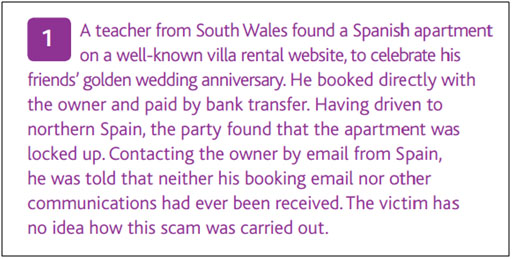
In this scenario, several groups in the UK planned to travel to Mecca for Hajj, the annual religious pilgrimage. Travel bookings were made online through a tour operator claiming to specialize in Hajj packages. However, when the scheduled pre-departure meetings were cancelled, the travelers discovered that the tour operator did not exist. It was a well-planned scam, and the fraudster managed to swindle amounts ranging from £1,100 to £14,000 from each victim.
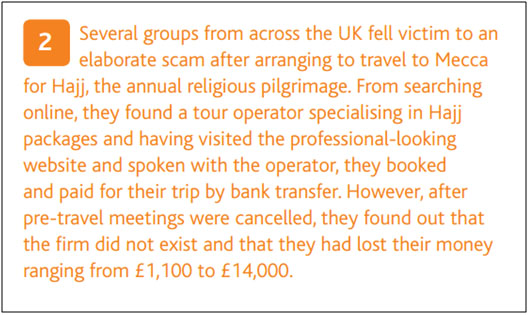
3. Cruise Booking Scam
Edgar received a refund of $100 from a cruise company after discovering that his booking had been made through a fraudulent travel agent. The cruise company was not responsible for the scam but issued a small refund as a gesture of goodwill.
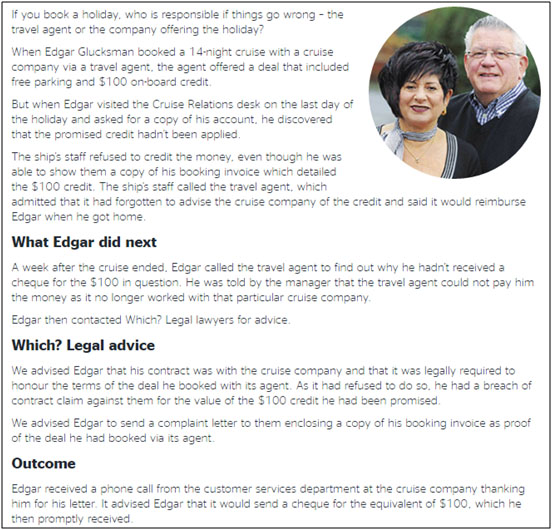
Valerie received compensation of £3,000 from Thomson Holidays after her holiday booking was cancelled at the last minute without her permission. The cancellation was not authorized by her, and the compensation was offered for the inconvenience and financial loss caused.
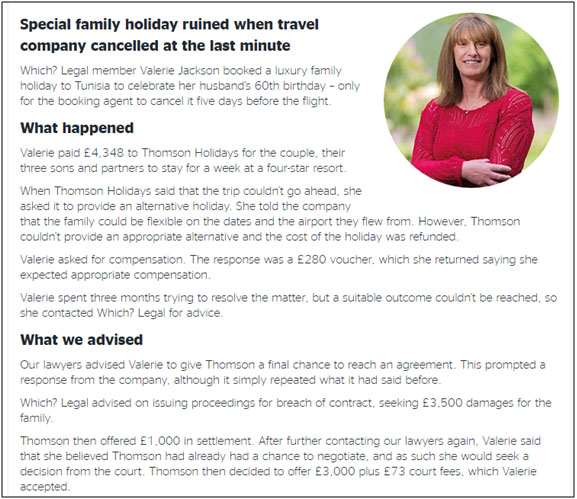
A couple received £1,162 in compensation from Thomas Cook due to a confusion that led to the cancellation of their cruise holiday. The mishap caused them significant inconvenience, for which the travel company compensated them.
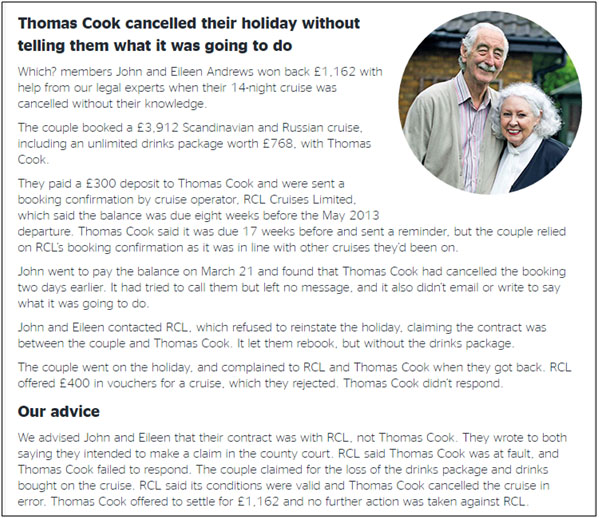
A couple’s dream trip to France with their grandchildren turned into a nightmare due to unexpected issues with the rented villa. The accommodation did not meet expectations, and unresolved problems during their stay severely affected their holiday experience.
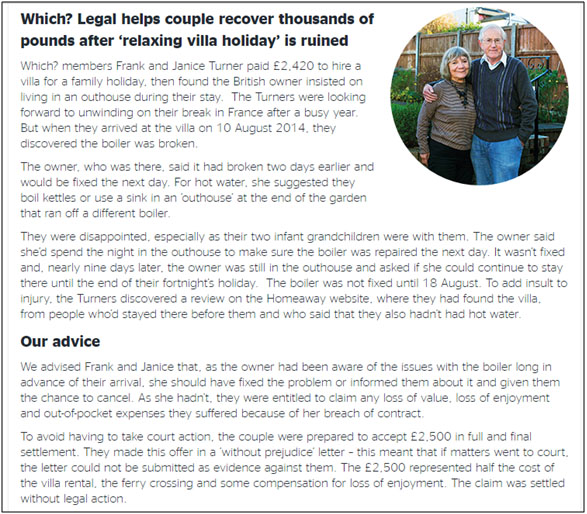
The Co-op Travel Agency agreed to pay £302 to Thomson Gold Hotel due to booking amendments that required compensation for changes made to the original reservation.
